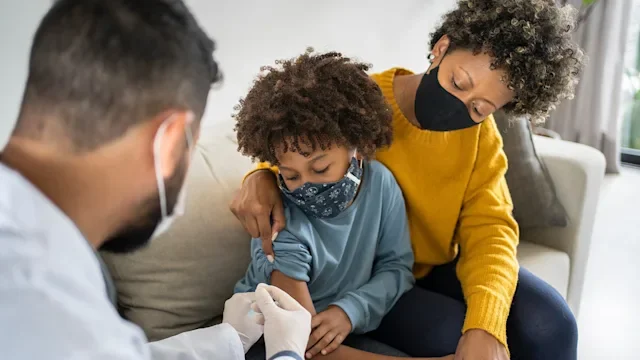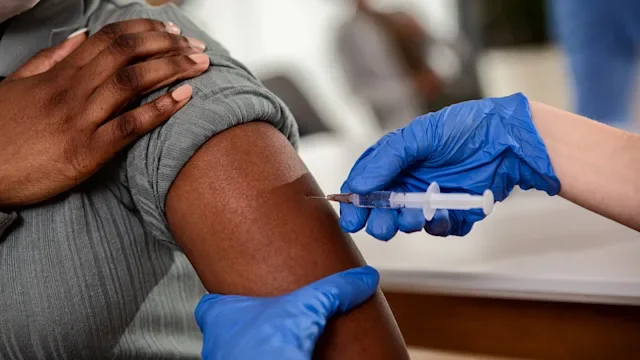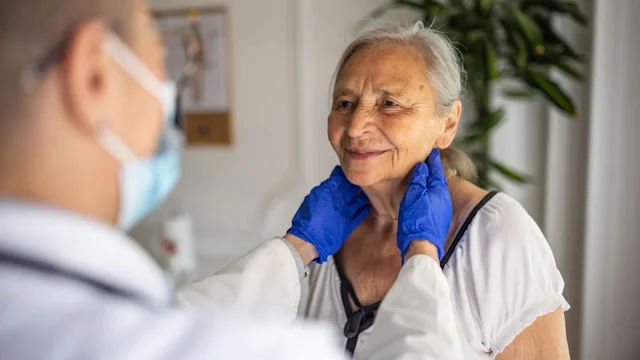Key takeaways:
Vaccines like the flu shot can’t make you sick, but they can cause side effects.
Side effects are generally mild and are different from serious allergic reactions.
If you have questions about a vaccine or are unsure if it is safe for you, talk to your healthcare provider.
Feeling sick after getting a vaccine like the flu shot can be frustrating, especially if it gets in the way of your daily activities. You may wonder if the vaccine made you sick or if you had a reaction to it. You might also wonder if it’s safe to get the vaccine again in the future, if you need it. Keep reading to find out more about what it means if you don’t feel well after a vaccine.
I got sick after my flu shot: Did it give me the flu?
The Centers for Disease Control and Prevention (CDC) recommends an annual flu shot for everyone 6 months and older, with very few exceptions. You may have had the flu shot in the past and remember feeling sick almost immediately after.
The good news is that the flu shot can’t give you the flu or make you sick. This is because the flu vaccines contain inactivated or dead viruses. Once the virus is inactivated, it can’t cause an infection. It does, however, give your body the information it needs to build immunity. That’s how the vaccine protects you from getting seriously ill later.
One flu vaccine that comes in the form of a nasal spray does contain live virus, but it is attenuated (or weakened), so it can’t cause infection. However, certain people should not receive the live vaccine, including:
Children less than 2 years old
Adults over age 50
People with weakened immune systems
This is because they can be at greater risk for complications from a live vaccine.
If you’ve felt sick after a flu shot in the past, there are a few possible explanations for that, as described below.
You’re experiencing side effects
If you had mild symptoms that started very soon after the shot, you were likely experiencing side effects from the vaccine. These usually last 1 to 2 days. The flu shot can cause symptoms that feel like the flu:
Body aches
Headache
Fever
Nausea
Read more like this
Explore these related articles, suggested for readers like you.
You can also have arm redness, swelling, and soreness where the shot was injected.
You’ve come down with another viral illness
There are other viruses that spread during flu season that cause similar symptoms like:
Cough
Fever
Runny nose
Body aches
This can make it difficult to tell if you have the flu — caused by the influenza virus — or another virus.
You didn’t have full immunity yet
After you get your flu shot, it takes your body about 2 weeks to develop immunity from the vaccine. It is possible that you were exposed to the flu right around the time you got your shot, but before you were fully protected by the vaccine.
You caught the flu
It is still possible to get the flu even though you got the flu shot. The vaccine is meant to make your illness less severe if you do get the flu and protect vulnerable people around you. The flu shot can also prevent the flu, but how well it does that varies year to year. Usually, it decreases the chance of getting the flu in most people by 40% to 60%.
Can I get sick from the COVID-19 vaccine?
No. The COVID-19 vaccine can’t make you sick or give you COVID-19. Like most flu vaccines, the COVID-19 vaccines do not contain a live COVID-19 virus, so they can’t cause infection. But the vaccine can cause side effects.
Common side effects include:
Soreness, redness, and swelling where the shot was given
Fatigue
Fever
Chills
Nausea
Headache
Body aches
Side effects usually develop shortly after you receive the vaccine and last a few days. Not everyone will have side effects, and they can be different in different people. You may experience stronger side effects after the second shot of the two-dose vaccines (made by Pfizer-BioNTech and Moderna).
How do I know if I have side effects or if I’m sick?
While vaccine side effects are common, the good news is they are usually mild and will resolve on their own in a few days. All vaccines can cause side effects. This is to be expected because vaccines trigger the immune system. But it is also possible to get a vaccine and not have any side effects at all.
Side effects can differ between vaccines, so it is important to review this information with your healthcare provider before you get the shot. For each vaccine approved in the U.S., the CDC publishes a Vaccine Information Statement (VIS). This document provides information about the benefits and risks of each vaccine, including common side effects. You can ask your healthcare provider for this information or find it here.
If you have symptoms after your vaccine that are more intense or last more than a few days, you may have another illness. You can discuss these symptoms with your healthcare provider to determine the cause and whether they are related to the vaccine.
Because side effects can be uncomfortable and frustrating, some people might try to prevent them by taking medications before a vaccination. But there is some evidence that taking medications like acetaminophen (Tylenol) or ibuprofen (Advil) before a shot may decrease your body’s immune response to the vaccine. For this reason, it is not recommended to take medication to prevent side effects before any vaccine, including the COVID-19 vaccine.
Are vaccine side effects a good sign?
If you have side effects to a vaccine, that means your immune system is responding. In other words, mild side effects are normal and mean that your body is doing the right thing.
It is also possible not to have any side effects after your shot. This doesn’t mean that the vaccine isn’t working, however. In fact, not everyone develops side effects after the COVID-19 vaccine. For example, about 33% of people in clinical trials for the Pfizer-BioNTech vaccine did not report any side effects beyond redness, pain, or swelling where the shot was given. But the clinical trials showed the vaccines are still highly efficacious, even though not everyone in the studies had side effects.
Can I get sick from a vaccine if I have an allergy to an ingredient in it?
While vaccine side effects are normal, allergic reactions can happen and are not part of the body’s normal response. An allergic reaction is when the immune system responds too strongly to a vaccine. Symptoms may include hives, itching, or wheezing. Allergic reactions can be serious. In fact, one of the main reasons not to get a vaccine is if you have an allergy to one of its ingredients or if you’ve had an allergic reaction to a previous dose.
Anaphylaxis is a serious type of allergic reaction that can be life-threatening. This can happen after a vaccine, but it is very rare. According to the World Health Organization (WHO), anaphylaxis occurs in 1 out of 1 million people given a vaccine. People with anaphylaxis can have:
Swelling of the face or throat
Trouble swallowing
Rash or hives
Wheezing or difficulty breathing
Low blood pressure
Fast heart rate
Stomach pain
Vomiting
These symptoms usually start 5 to 30 minutes after a vaccine is given. Anyone with these signs or symptoms needs immediate medical attention.
If you have concerns about whether you can safely get a vaccine, talk to your healthcare provider first. You can read more about reasons why it’s not safe to get certain vaccines here.
What should I do if I don’t feel well after a vaccine?
There are a few steps you can take if you don’t feel well after a vaccine.
Talk to your healthcare provider
They can help you understand and manage your symptoms. Mild vaccine side effects can usually be treated at home to help you feel better. For example, over-the-counter medications like ibuprofen and acetaminophen can treat body aches and fever after you get your shot. Cold compresses can relieve arm soreness and swelling. Your healthcare provider can help you decide the best course of action.
Be patient
Remember that side effects don’t last long and go away on their own. However, if you have any of the signs or symptoms of allergy or anaphylaxis listed above, seek medical assistance right away.
Report serious reactions
If you think you had a serious reaction to a vaccine beyond mild side effects, you can report any concerns to the Vaccine Adverse Event Reporting System (VAERS). The CDC and Food and Drug Administration (FDA) use this system to collect information and ensure vaccine safety. Anyone can make a report with the VAERS.
Don’t skip future doses
It is important to know that having mild side effects after a shot is not a reason to avoid future recommended doses of a vaccine. If you are unsure, be sure to discuss this with your healthcare provider.
The bottom line

Why trust our experts?


Vaccines are a safe and effective way to prevent serious illnesses. Although vaccines can cause some uncomfortable side effects, serious reactions are very rare. Vaccines like the flu shot and COVID-19 immunization don’t make you sick. They are designed so your body can develop immunity to the virus without causing an infection. If you are ever concerned about how you feel after a vaccine, talk to your healthcare provider so they can help you understand and manage your symptoms.
















